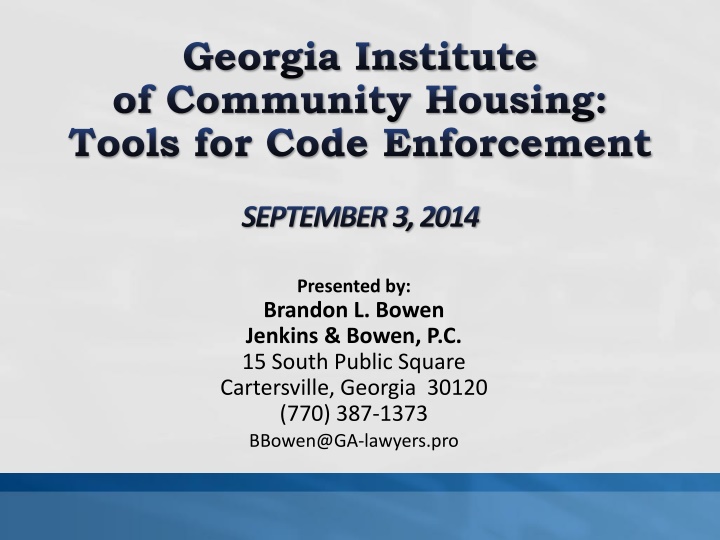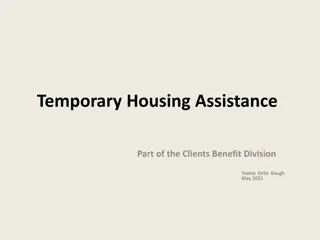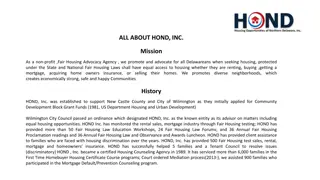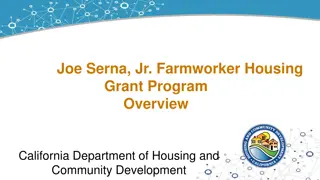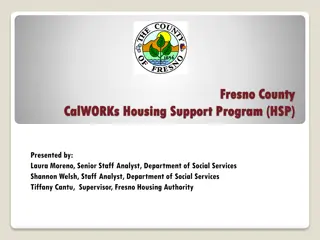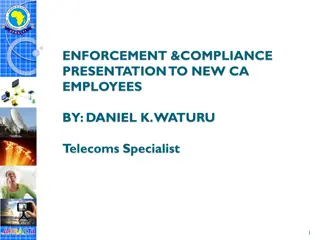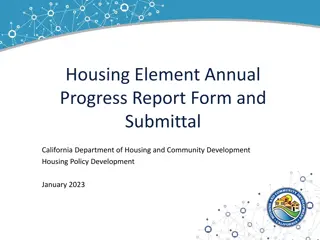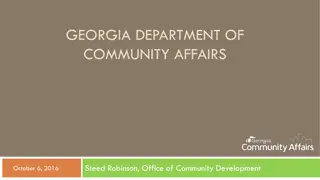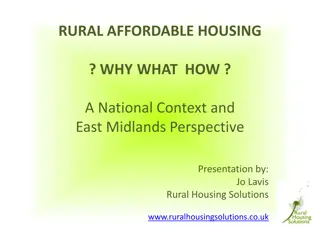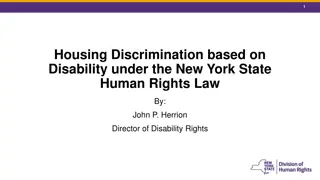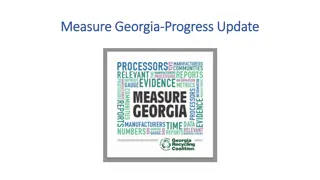Georgia Institute of Community Housing: Tools for Code Enforcement
Presented by Brandon L. Bowen of Jenkins & Bowen, P.C., this presentation outlines tools for enforcing state minimum standard codes in Georgia, including useful ordinance provisions and actions for dealing with unfit properties. It covers mandatory codes, enforcement procedures, and the roles of building inspectors. The process for obtaining building permits, required applicant filings, inspection schedules, and final occupancy certificates are also discussed.
Download Presentation

Please find below an Image/Link to download the presentation.
The content on the website is provided AS IS for your information and personal use only. It may not be sold, licensed, or shared on other websites without obtaining consent from the author.If you encounter any issues during the download, it is possible that the publisher has removed the file from their server.
You are allowed to download the files provided on this website for personal or commercial use, subject to the condition that they are used lawfully. All files are the property of their respective owners.
The content on the website is provided AS IS for your information and personal use only. It may not be sold, licensed, or shared on other websites without obtaining consent from the author.
E N D
Presentation Transcript
Georgia Institute of Community Housing: Tools for Code Enforcement SEPTEMBER 3, 2014 Presented by: Brandon L. Bowen Jenkins & Bowen, P.C. 15 South Public Square Cartersville, Georgia 30120 (770) 387-1373 BBowen@GA-lawyers.pro
TOOLS FOR ENFORCEMENT State minimum standard codes Useful ordinance provisions Public nuisance law Unfit Property actions
State Minimum Standard Codes (Mandatory Codes); with Georgia Amendments 1. International Building Code (ICC 2006 Ed.) 2. National Electrical Code (NFPA 2008 Ed.) 3. International Fuel Gas Code (ICC 2006 Ed.) 4. International Mechanical Code (ICC 2006 Ed.) 5. International Plumbing Code (ICC 2006 Ed.) 6. International Residential Code for One and Two-family Dwellings (ICC 2006 Ed.) 7. International Energy Conservation Code (ICC 2006 Ed.) 8. International Fire Prevention Code (ICC 2006 Ed.) O.C.G.A. 8-2-20, 8-2-25
ENFORCEMENT OF CODES Local governments must adopt reasonable administrative procedures in order to enforce them (e.g., hearings, appeals)(O.C.G.A. 8-2-25(a)).
WHO IS TO ENFORCE? Employed Building inspector? Contracted Building Inspector? Private Inspector?
WHAT IS THE PROCESS? Building Permit issued administratively as of right if you are in the right zone, and you meet the proper dimensional requirements, clerk issues the permit.
WHAT DO YOU REQUIRE THE APPLICANT TO FILE? Site plan? Elevations? Septic / sewer connection and other utilities? Landscape plan?
WHEN DO INSPECTIONS OCCUR? Generally best to have inspections through the process- otherwise it is difficult to determine compliance.
FINAL INSPECTION LEADS TO CERTIFICATE OF OCCUPATION / CO Authority to revoke the CO for unfit housing violations. Direct utilities to stop service- cut off water.
FEES The ordinance ought to provide the fees- regulatory fees must be reasonably geared to pay the cost of providing the service, but not be geared to generate revenue. For outside inspectors, that may mean a small fee and payment of the outside inspector s contract rate.
APPEALS There has to be an appeal process in case the applicant does not agree with the building inspector s determination. Board of Appeal / City Council.
Permissive codes (with Georgia Amendments); may be adopted if desired; notify DCA of adoption 1. International Existing Building Code (ICC 2006 Ed.) (focuses on remodeling existing buildings) 2. International Property Maintenance Code (ICC 2006 Ed.) (focuses on property maintenance) O.C.G.A. 8-2-25
304.4 Structural members. All structural members shall be maintained free from deterioration, and shall be capable of safely supporting the imposed dead and live loads. 304.13 Window, skylight and door frames. Every window, skylight, door and frame shall be kept in sound condition, good repair and weather tight.
307.1 General. Every exterior and interior flight of stairs having more than four risers shall have a handrail on one side of the stair and every open portion of a stair, landing, balcony, porch, deck, ramp or other walking surface which is more than 30 inches (762 mm) above the floor or grade below shall have guards. Handrails shall not be less than 30 inches (762 mm) in height or more than 42 inches (1067 mm) in height measured vertically above the nosing of the tread or above the finished floor of the landing or walking surfaces. Guards shall not be less than 30 inches (762 mm) in height above the floor of the landing, balcony, porch, deck, or ramp or other walking surface.
302.5 Rodent harborage. All structures and exterior property shall be kept free from rodent harborage and infestation. Where rodents are found, they shall be promptly exterminated by approved processes which will not be injurious to human health. After pest elimination, proper precautions shall be taken to eliminate rodent harborage and prevent reinfestation.
302.9 Defacement of property. No person shall willfully or wantonly damage, mutilate or deface any exterior surface of any structure or building on any private or public property by placing thereon any marking, carving or graffiti. It shall be the responsibility of the owner to restore said surface to an approved state of maintenance and repair.
308.1 Accumulation of rubbish or garbage. All exterior property and premises, and the interior of every structure, shall be free from any accumulation of rubbish or garbage. 301.3 Vacant structures and land. All vacant structures and premises thereof or vacant land shall be maintained in a clean, safe, secure and sanitary condition as provided herein so as not to cause a blighting problem or adversely affect the public health or safety.
303.2 Enclosures. Private swimming pools, hot tubs, and spas containing water more than 24 inches (610 mm) in depth shall be completely surrounded by a fence or barrier at least 48 inches (1219 mm) in height above the finished ground level measured on the side of the barrier away from the pool. Gates and doors in such barriers shall be self-closing and self-latching. Where the self-latching device is a minimum of 54 inches (1372 mm) above the bottom of the gate, the release mechanism shall be located on the pool side of the gate. Self-closing and self-latching gates shall be maintained such that the gate will positively close and latch when released from an open position of 6 inches (152 mm) from the gatepost. No existing pool enclosure shall be removed, replaced or changed in a manner that reduces its effectiveness as a safety barrier.
Useful Zoning Ordinance Provisions 1. Appearance of Property: junk, trash, debris, tall grass and vegetation. 2. Junk, inoperative, untagged vehicles; commercial parking limits (side, rear). 3. Storage, storage containers, vehicles as storage, storage of tires. 4. Residential living: no RVs, no tents, etc. 5. Parking commercial vehicles, RVs 6. Minimum Fines
Code Enforcement Staff Can be civilian or peace officer: training on gathering evidence and presenting a case is key. Issue citations to municipal court. Potentially civil administrative fines. System to track complaints, citations, and repeat offenders is critical.
BENEFITS OF MUNICIPAL COURT Quick to get to court Speedy court proceedings Inexpensive Locally responsive
Municipal Courts Jurisdiction: Incorporated City Limits Punishment: Varies by charter; community service; suspended sentence. Municipal court judge: appointed. Cannot remove to state court for jury trial on ordinance violation; can remove state law violation.
Next step: Superior Court INJUNCTIVE RELIEF and Civil Fines Jurisdiction: general. Punishment: limited only by ordinance; community service; suspended sentence. Superior court judge: elected. Contempt power: criminal and civil.
ABATEMENT OF PUBLIC NUISANCE A nuisance is anything that causes hurt, inconvenience, or damage to another May be nuisance even though otherwise lawful activity Must affect ordinary, reasonable person O.C.G.A. 41-1-1
Lawsuit to Abate Public Nuisance May be filed by district attorney, solicitor-general, city attorney, or county attorney. O.C.G.A. 41-2-2 Key point: Municipal courts have jurisdiction and power to order abatement. O.C.G.A. 41-2-5
UNFIT PROPERTY ORDINANCES A city or county may take action against such buildings or structures which are unfit for human habitation or for commercial, industrial, or business occupancy or use and not in compliance with the applicable state minimum standard codes as adopted by ordinance. O.C.G.A. 41-2-7
Adoption of Ordinances Relating to Unfit Buildings Can adopt Unfit Property Ordinance O.C.G.A. 41-2-9 A public officer must be identified to exercise the powers prescribed by the ordinance Law has detailed notice standards; includes title search
What is UNFIT FOR USE? Determination that building is unfit may rest upon some or all of the following conditions: Defects increasing hazards of fire or accidents Lack of adequate ventilation and light or sanitary facilities Dilapidation Disrepair Structural defects Uncleanliness O.C.G.A. 41-2-10
Steps to Unfit Property Enforcement File Complaint Notice and hearing Order to repair or demolish, or authorize local government to do so; costs of demolition cast as lien against property. O.C.G.A. 41-2-9
Foreclosure and Vacant Property Registry O.C.G.A. 44-14-14 Allows local governments to adopt a limited and uniform registration requirement for vacant property. Preempts other local registration requirements.
Vacant Real Property Defined Real property that is intended for habitation, but has not been inhabited for 60 days, has no evidence of utility usage, and is not actively being marketed for sale or rent, or Partially constructed without a valid building permit, or Is held as a result of foreclosure. Excludes multi-family structures where any one unit is being inhabited.
Foreclosure Registration Grantee of the foreclosure deed or deed in lieu of foreclosure and next subsequent transferee must give local government the following information: - owner s name, address, phone, fax, e-mail - agent s name, address, phone, fax, e-mail - vacant property s address - transfer date - recording info (deed book and page number)
Foreclosure Registration, contd Owner has at least 90 days to file. If they file the deed with the Clerk of the Superior Court within 60 days, it contains all the required information, and they notify the County and provide the recorded deed and information, then no fee. Otherwise, fee of no more than $100. Penalties of no more than $1,000 for failing to register.
O.C.G.A. 44-14-14 is Not Self-Effectuating The local government is required to adopt an ordinance complying with the statute in order to enforce a vacant property registration requirement. Requires administrative procedures.
Community Redevelopment District Georgia Constitution, Art. 9 2 VII(d) Authorizes cities and counties to establish redevelopment zones. Provides for tax incentives (negative and positive) to encourage redevelopment of blighted areas. Increased taxes on blighted properties to pay for community redevelopment. Reduced taxes if property owner submits a redevelopment plan. Excludes residential properties.
